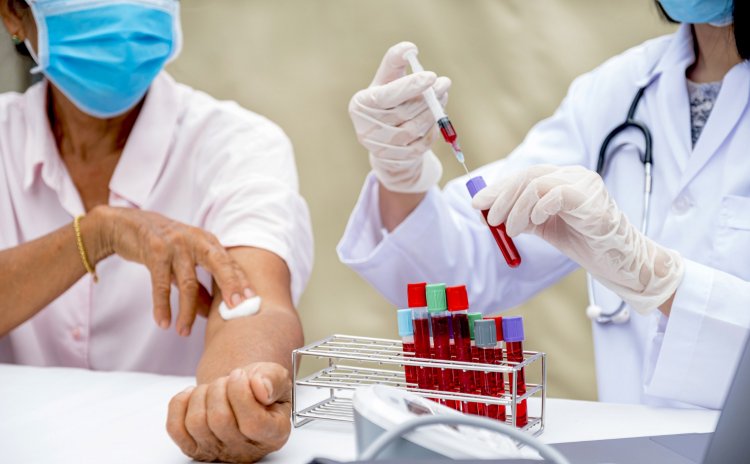Unlocking the Mysteries of Health: Exploring the Depths of Blood Tests
In the realm of modern medicine, our understanding of human health has been greatly enhanced by the utilization of blood tests. These invaluable tools offer a window into the inner workings of the body, providing clinicians with vital insights that aid in diagnosis, treatment, and preventive care. From routine check-ups to the management of chronic conditions, blood tests play a central role in safeguarding our well-being.

The Language of Blood: Deciphering Diagnostic Markers
Imagine a single drop of blood containing a wealth of information about our health. Within its crimson hue lies a complex array of cells, proteins, and molecules, each offering clues about our physiological state. When we undergo a blood test, we embark on a journey of discovery, delving into the intricacies of our biological makeup.
Complete Blood Count (CBC)
This comprehensive test examines the cellular components of blood, including red blood cells, white blood cells, and platelets. Abnormalities in these parameters can indicate conditions such as anemia, infection, or clotting disorders.
Erythrocyte Sedimentation Rate (ESR)
Elevated ESR levels suggest the presence of inflammation in the body, which may be indicative of various diseases such as rheumatoid arthritis, infections, or certain cancers.
Renal Function Tests (BUN, Creatinine)
These tests assess the functioning of the kidneys by measuring levels of blood urea nitrogen (BUN) and creatinine. Abnormal results may signal kidney disease or impairment.
Liver Function Tests (AST, ALT, ALP, GGT)
Reflecting the health of the liver, these tests measure levels of enzymes and proteins in the blood. Deviations from normal ranges may indicate liver damage or disease.
Glucose and HbA1c
Crucial for monitoring diabetes, these tests measure blood sugar levels and glycated hemoglobin (HbA1c), providing insights into long-term glycemic control.
Lipid Profile (Cholesterol, Triglycerides, HDL, LDL)
This panel assesses levels of cholesterol and triglycerides, helping evaluate cardiovascular risk and guide preventive measures.
Thyroid Function Tests (TSH, FT4, FT3)
These tests evaluate thyroid function, aiding in the diagnosis and management of thyroid disorders such as hypothyroidism and hyperthyroidism.
Electrolyte Panel (Sodium, Potassium, Calcium, Phosphate, Magnesium)
This panel measures electrolyte levels in the blood, which are essential for various bodily functions. Abnormalities can indicate dehydration, kidney disease, or hormonal imbalances.
Coagulation Studies (PT, INR, PTT)
These tests assess blood clotting function by measuring factors involved in the coagulation process. They help diagnose bleeding disorders and monitor anticoagulant therapy.
C-Reactive Protein (CRP)
CRP is a marker of inflammation in the body. Elevated levels may indicate infection, inflammation, or tissue damage.
Rheumatoid Factor (RF) and Autoantibodies
These tests help diagnose autoimmune diseases such as rheumatoid arthritis by detecting antibodies produced by the immune system.
Viral Hepatitis Markers (HBsAg, Anti-HBs, Anti-HCV)
These tests detect markers of hepatitis B and C infections, helping diagnose and monitor these viral diseases.
Serum Protein Electrophoresis (SPEP)
This test separates and measures the different proteins in the blood, helping diagnose conditions such as multiple myeloma and other protein-related disorders.
Iron Studies (Iron, Ferritin, TIBC)
These tests evaluate iron levels in the blood and the body's iron storage capacity. They help diagnose iron deficiency anemia and other iron-related disorders.
Blood Gas Analysis
This test measures levels of oxygen, carbon dioxide, and pH in the blood, providing insights into respiratory and metabolic function.
Allergy Testing (IgE)
This test measures levels of immunoglobulin E (IgE) antibodies in the blood, helping diagnose allergies to specific substances.
By incorporating these tests into routine medical care, healthcare providers can gain valuable insights into a patient's health status, allowing for timely diagnosis, treatment, and preventive interventions.
#TheLanguageofBlood #DecipheringDiagnosticMarkers #Healthcare #BloodTests #MedicalTests #HealthInsights #HealthcareProviders #MedicalCare #TimelyDiagnosis #Treatment #PreventiveInterventions
Disclaimer:
The information provided in this article is for educational purposes only and should not be considered medical advice. If you have any health concerns or are experiencing symptoms, it is important to consult with a healthcare professional, such as a doctor or clinic, for proper diagnosis and treatment. Always seek the advice of your doctor or other qualified health provider with any questions you may have regarding a medical condition. Do not disregard professional medical advice or delay in seeking it because of something you have read in this article.
What's Your Reaction?





















